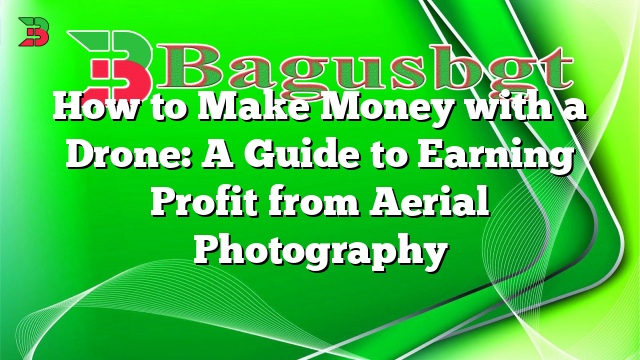Salam, fellow readers! Drones have revolutionized the field of aerial photography, opening up endless possibilities for capturing stunning images and videos from above. But did you know that you can also turn your passion for drones into a profitable venture? In this article, we will explore various ways to make money with a drone and delve into the advantages, disadvantages, and alternative options available in this exciting industry.
1. Real Estate Photography: Showcasing Properties from a Unique Perspective
One lucrative avenue for drone enthusiasts is real estate photography. By offering aerial shots and videos, you can help real estate agents showcase properties from a unique perspective, attracting potential buyers. The advantage of drone photography in this field is its ability to capture the entire property in a single frame, emphasizing the size and surroundings. However, the disadvantage lies in the need to obtain proper permissions and licenses, as well as ensuring safety during flights.
2. Construction and Surveying: Efficient Monitoring and Mapping
Drones have become an invaluable tool in the construction and surveying industry. These aerial devices can provide accurate and efficient monitoring of construction sites, helping project managers track progress and identify potential issues. Drones can also be used for surveying land, creating detailed maps and 3D models. The main advantage of using drones in this field is the time and cost savings, as they eliminate the need for manual labor and expensive equipment. However, drawbacks include the initial investment in high-quality drones and the requirement for skilled operators.
3. Event Coverage: Capturing Special Moments from Above
Event organizers are increasingly turning to drone operators to capture breathtaking aerial shots of weddings, concerts, and sports events. Drones can provide a unique perspective, adding a wow factor to the overall coverage. However, strict regulations governing drone usage in crowded areas and the need to prioritize safety can be challenging. Additionally, weather conditions and flight restrictions may limit your opportunities in this field.
4. Agriculture: Precision Farming and Crop Monitoring
Drones have found their way into the agricultural sector, offering farmers a cost-effective solution for precision farming and crop monitoring. Equipped with thermal cameras and advanced sensors, drones can identify crop health, detect irrigation issues, and even help with pesticide distribution. The advantages of using drones in agriculture include increased efficiency, reduced costs, and improved crop yields. However, the initial investment, the need for specialized knowledge, and the limited battery life of drones remain challenges to consider.
5. Filmmaking and Videography: Elevating Visual Storytelling
If you have a passion for filmmaking or videography, drones can take your projects to new heights – quite literally! Aerial shots offer a unique perspective and can add a cinematic touch to any production. However, mastering the art of drone piloting and capturing smooth footage requires practice and skill. Moreover, strict regulations may restrict drone usage in certain filming locations, and the noise produced by drones can be a hindrance in some situations.
6. Inspections and Surveys: Accessing Hard-to-Reach Areas
Drones provide a safe and efficient solution for inspections and surveys in hard-to-reach areas, such as bridges, tall structures, and power lines. By utilizing drones, companies can avoid putting human lives at risk and save considerable time and money. However, the complexity of operating drones in confined spaces and the need for expertise in data analysis are factors to consider. Additionally, regulations may require certification or licensing for conducting inspections using drones.
7. Delivery Services: The Future of Last-Mile Delivery
The concept of using drones for delivery services has gained significant attention in recent years. Companies like Amazon and Google are exploring the potential of drones to revolutionize the last-mile delivery process. While this field is still in its early stages and faces numerous regulatory challenges, the advantages of drone delivery include faster delivery times and reduced transportation costs. However, limitations in payload capacity, flight range, and safety concerns remain obstacles to overcome.
8. Mapping and Cartography: Creating Accurate Geospatial Data
Mapping and cartography have been revolutionized by the integration of drones. These aerial devices can capture high-resolution images and collect data to create accurate maps and geospatial models. The advantages of using drones for mapping include increased efficiency, reduced costs, and the ability to access challenging terrain. However, the need for advanced image processing software and the complexity of data analysis can be daunting for beginners.
9. Environmental Monitoring: Preserving Nature from Above
Drones can play a crucial role in environmental monitoring and conservation efforts. They can be used to track wildlife, monitor deforestation, and assess the impact of natural disasters. The advantages of using drones in this field are their ability to cover large areas quickly and their non-invasive nature. However, strict regulations regarding wildlife disturbance and the limited flight time of drones can pose challenges in certain scenarios.
10. Aerial Inspections: Enhancing Safety and Efficiency
Drones have proven to be a game-changer in industries that require regular inspections, such as oil and gas, telecommunications, and infrastructure. By utilizing drones, companies can conduct inspections in a safer, more efficient manner, minimizing downtime and reducing costs. However, the need for skilled operators, the risk of technical failures, and the potential interference with existing systems are factors that need to be addressed.
Alternative Options: Thinking Outside the Box
Aside from the aforementioned options, there are several alternative ways to make money with a drone. Some examples include aerial advertising, wildlife photography, drone racing events, and even aerial art installations. These unconventional avenues require creativity, adaptability, and a deep understanding of the specific niche.
Table: Opportunities to Make Money with a Drone
Opportunity |
Advantages |
Disadvantages |
|---|---|---|
Real Estate Photography |
Showcasing unique perspectives |
Permissions, licenses, and safety concerns |
Construction and Surveying |
Time and cost savings |
Initial investment and skilled operators |
Event Coverage |
Unique perspective and wow factor |
Regulations and limited opportunities |
Agriculture |
Efficiency and improved crop yields |
Investment, specialized knowledge, and limited battery life |
Filmmaking and Videography |
Elevating visual storytelling |
Skill acquisition and location restrictions |
Inspections and Surveys |
Safety and efficiency in hard-to-reach areas |
Operating complexities and data analysis expertise |
Delivery Services |
Faster delivery and reduced costs |
Payload limitations and safety concerns |
Mapping and Cartography |
Efficiency and accurate geospatial data |
Advanced software and data analysis complexity |
Environmental Monitoring |
Large area coverage and non-invasiveness |
Regulations and limited flight time |
Aerial Inspections |
Safety and efficiency in inspections |
Skilled operators and technical risks |
Conclusion
In conclusion, drones offer countless opportunities to make money in various industries. From real estate photography and construction monitoring to event coverage and environmental preservation, the potential is vast. However, it’s essential to consider the advantages and disadvantages specific to each field, as well as the legal requirements and investment needed. With the right skills, knowledge, and passion, turning your drone hobby into a profitable venture is within reach.
Frequently Asked Questions (FAQ)
Q: How much can I earn by offering real estate photography services with a drone?
A: The earnings from real estate photography vary depending on factors such as location, demand, and the quality of your work. However, it is possible to earn a substantial income by offering unique aerial perspectives to real estate agents and property owners.
Q: Do I need a license to make money with a drone?
A: Yes, in most countries, you are required to obtain a license or permit to operate a drone commercially. The specific requirements may vary, so it’s crucial to familiarize yourself with the regulations in your area.
Q: Are there any insurance requirements for drone operators?
A: Yes, insurance is crucial for drone operators. It provides protection against accidents, damages, and liabilityclaims. It’s important to have proper insurance coverage to protect yourself and your clients in case of any unforeseen incidents.
Q: What equipment do I need to start making money with a drone?
A: To start making money with a drone, you will need a high-quality drone with a good camera, spare batteries, memory cards, and a reliable remote controller. Additionally, investing in accessories like propeller guards and carrying cases can help ensure the safety and longevity of your equipment.
Q: Can I use my personal drone for commercial purposes?
A: In most cases, personal drones are not suitable for commercial purposes. Commercial drones are typically equipped with more advanced features, such as higher resolution cameras, longer flight times, and better stability. It’s important to invest in a drone specifically designed for commercial use to ensure optimal performance and results.
Q: How can I market my drone services?
A: To market your drone services, it’s essential to build a strong online presence through a website or social media platforms. Showcase your portfolio, create engaging content, and actively engage with potential clients. Networking with professionals in related industries, such as real estate agents or event planners, can also help you secure more clients.
Q: What are the legal restrictions for drone operations?
A: The legal restrictions for drone operations vary from country to country. Generally, drone operators must adhere to regulations regarding flight altitude, no-fly zones, and privacy concerns. It’s crucial to research and understand the specific regulations in your area and obtain any necessary permits or licenses before conducting commercial drone operations.
Q: Are there any ongoing expenses associated with running a drone business?
A: Yes, running a drone business entails ongoing expenses. These may include licensing fees, insurance premiums, equipment maintenance and repairs, and marketing costs. It’s important to factor in these expenses when determining pricing for your services to ensure a sustainable and profitable business.
Q: How can I improve my drone photography and videography skills?
A: Improving your drone photography and videography skills requires practice, experimentation, and continuous learning. Joining photography and videography communities, taking online courses, and studying different techniques can help you enhance your skills. Additionally, investing in post-processing software and learning editing techniques can significantly improve the quality of your final products.
Q: Are there any risks associated with flying drones?
A: Yes, flying drones comes with inherent risks. These include potential accidents, damage to property or people, and privacy concerns. It’s crucial to prioritize safety by following regulations, conducting pre-flight checks, and maintaining situational awareness while operating your drone. Additionally, having liability insurance can provide financial protection in case of any accidents or damages caused by your drone.
Q: Are there any ethical considerations when using drones for commercial purposes?
A: Yes, there are ethical considerations when using drones for commercial purposes. Respecting privacy rights, obtaining proper permissions for flying over private properties, and minimizing disturbances to wildlife and natural habitats are important ethical considerations. It’s essential to operate your drone responsibly and in accordance with local laws and regulations to ensure ethical practices.
Remember, always stay updated with the latest regulations, continuously improve your skills, and prioritize safety and professionalism in your drone operations. With dedication and a passion for aerial photography, you can turn your drone hobby into a successful and rewarding business venture.
 Bagus Banget Kumpulan Informasi terbaru dari berbagai sumber yang terpercaya
Bagus Banget Kumpulan Informasi terbaru dari berbagai sumber yang terpercaya




